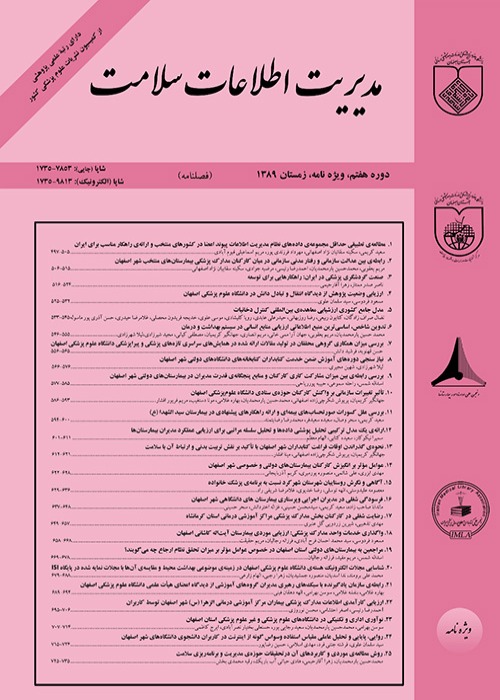Radio Frequency Identification (RFID) in Surgery Ward
Author(s):
Abstract:
Introduction
A 65-year-old patient who was admitted for heart surgery was transferred to operation room again in a specialized hospital in Tehran so that the accumulated fluid around his heart and lungs can be emptied. Experiments and resampling showed that the first surgery had been mistakenly done on the patient; the patient who was supposed to undergo surgery at that time was the next bed and hospital personnel had taken the other one to operation room by mistake (1). In Iran there is no documented information on the rate of medical errors; however, incidents such as the above case represent the highest rate of medical errors due to lack of proper identification of patients. Approximately, 25% of hospitalized patients face some kind of medical error some part of which is due to improper identification of patients (2). Radio Frequency Identification (RFID) means identification through radio waves which is one of the important members of the family of Automatic Identification and Data Capture (AIDC) based on electromagnetic waves (3,4). From RFID system, data are automatically extracted using special tools, after which it is transmitted to users at the desired time and place. RFID has been recognized as one of ten top global techniques in 2004-2005 which simultaneously covers the areas of information management, recognition, and tracking, authentication, and process automation (4). If patients who need surgery have RFID wristbands with related information and digital images from patient, clinical team will be able to deal with patients correctly. Moreover, electronic interpolation ensures the team about following the right process, and if a patient is taken into the operation room mistakenly, the mismatch and an error will be identified automatically and immediately (5). In this regard, the results of a research done by Aguad and colleagues on "Benefits of Connecting RFID and Lean Principle in Health Care" (2005) showed that given the complexities and challenges of today's world, this technology can boost the performance of the medical sector and decrease human errors (6). Cangialos et al. (2007) represented their satisfaction regarding implementation of RFID in the studied hospitals in their study titled "Applying RFID to patient Care: Challenges and Opportunities". Their results show that this technology facilitates turnover in hospitals, decreases nurses and personnel's work load, and leads to a better interaction among physicians, nurses, and patients (7). Liu et al. showed that the use of RFID-based monitoring system can help in management of surgery process, patient positioning, identification, and follow up surgery care. Moreover, this system provides continuous monitoring of work processes and makes the information available to users in order to promote management efficiency. This system is a valuable management tool to address security, quality, and efficiency in surgery wards (8). NJ hospital in India is an example of successful implementation of RFID in monitoring security and management of pediatrics ward (9).Conclusion
The main reason for some medical errors is inadequate access to information at decision-making time as well as poor communication among care team healthcare providers. This issue is critical in a place such as surgery room where access to on timely information on the patient's status is essential to ensure accurate performance of medical personnel. RFID technology can bring about efficiency and profitability of health care services through creating on timely information and its comprehensive understanding of healthcare personnel. Use of RFID technology will increase productivity and quality of services in hospitals and healthcare systems.Keywords:
Language:
Persian
Published:
Health Information Management, Volume:12 Issue: 1, 2015
Pages:
1 to 2
magiran.com/p1412343
دانلود و مطالعه متن این مقاله با یکی از روشهای زیر امکان پذیر است:
اشتراک شخصی
با عضویت و پرداخت آنلاین حق اشتراک یکساله به مبلغ 1,390,000ريال میتوانید 70 عنوان مطلب دانلود کنید!
اشتراک سازمانی
به کتابخانه دانشگاه یا محل کار خود پیشنهاد کنید تا اشتراک سازمانی این پایگاه را برای دسترسی نامحدود همه کاربران به متن مطالب تهیه نمایند!
توجه!
- حق عضویت دریافتی صرف حمایت از نشریات عضو و نگهداری، تکمیل و توسعه مگیران میشود.
- پرداخت حق اشتراک و دانلود مقالات اجازه بازنشر آن در سایر رسانههای چاپی و دیجیتال را به کاربر نمیدهد.
In order to view content subscription is required
Personal subscription
Subscribe magiran.com for 70 € euros via PayPal and download 70 articles during a year.
Organization subscription
Please contact us to subscribe your university or library for unlimited access!


